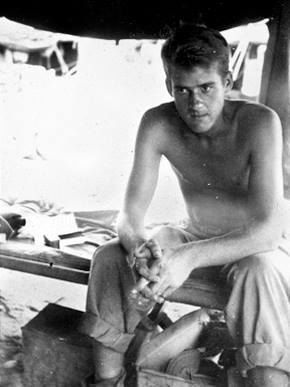Recently Kristy and I were looking for something to watch on TV. We happened across “The Pacific,” the brilliant Tom Hanks / Steven Speilberg production that chronicles World War 2 battles in the South Pacific.

We enjoyed the series, and were especially intrigued by a character who hailed from our home state of Alabama. The man’s name was Eugene Sledge. Naturally, his Marine buddies called him “Sledgehammer.”
Despite his blunt nickname, Sledgehammer was depicted as a thoughtful well educated fellow who smoked a pipe, read his Bible, and kept detailed notes on the war. His sense of patriotism ran so deep, he actually dropped out of officer school (a path with more guaranteed creature comforts) to instead join the Marines as an enlisted man – in order to get to the war faster!
It wasn’t until the end of the TV series that – to my chagrin – I realized that “The Pacific” was based upon the actual writings of real veterans. A quick Google search revealed that Eugene Sledge was not only a real person – he had lived most of his adult life in Montevallo, only a few miles south of our own hometown! I was stunned, and wanted to learn more about this man they called Sledgehammer.
I immediately picked up a copy of his book: “With the Old Breed: at Peleliu and Okinawa.”
Wow.
It turns out that “Sledgehammer” was not only a patriot; he was a gifted and eloquent writer.
Before reading “With the Old Breed,” I thought I had a pretty good grasp of what happened during World War II and what combat veterans experienced on the front lines of battle.
Reading this book gave me a new understanding and appreciation for what happened during that era, and what those soldiers endured. The fighting in the South Pacific was very different from that in Europe.
As a rifleman and mortar specialist, Sledge experienced life on the front lines. What makes his book so special is his account from the infantryman’s point of view. As fate would have it, he was shipped to the South Pacific, and tossed into Peleliu and Okinawa, two of the most brutal battlefields the Marine Corps has ever seen.
In “With the Old Breed,” Sledge takes you to the front lines of battle. As he explains, these men faced horrors more extreme than others serving the war effort. “We were expendable!” wrote Sledge. “To find oneself in a situation where your life seems of little value is the ultimate in loneliness.”
How bad was it?
On Peleliu alone, 1,508 American Marines were killed. The Japanese refused to surrender and fought to the death; so almost every Japanese soldier on the island was killed (10,900 killed, 202 captured).
Of 250 men in Sledge’s own company, 240 were killed or injured. Only 10 emerged with no physical injuries, and Sledge was among that small number. But, as he wrote, “none emerged unscathed.”
Sledge’s own term for the conditions at Peleliu was “unbelievable.” Extreme heat, no sanitation or timely corpse removal, biting insects, and water shortages served as backdrop against constant 24-hour combat to the death versus a maniacal enemy that occupied all of the island’s most defensible ground.
The hellish Peleliu battle dragged on for more than two months.
Some men were understandably driven to insanity.
How bad was it?
Sledge reported that after returning to the United States, he suffered nightmares for the next twenty years.
It was so bad, many of you will have difficulty even reading about it.
He lived it. You can’t even bear to read about it.
Yet this is one of those books that should be required reading of every American. If you want to recalibrate your understanding of war, and of life in peacetime America, read this book.
After reading the book, I felt a profound pride in what Sledge accomplished. Although he died in 2001, he left behind one of the 20th Century’s most important war memoirs. It’s an outstanding tribute to the men who lost their lives in the South Pacific.
This book will also cause one to reassess what it means to have a problem or face a challenge. You may think that you have problems. But whatever your problems, I doubt you would trade places with one of those 1508 Marines who gave everything at Peleliu. Quit complaining about life! Start appreciating its opportunities.
We typically talk about lighthearted fare here on Long Long Honeymoon. But today is MEMORIAL DAY, a time to stop to appreciate the soldiers who suffered and sacrificed their lives so that the rest of us can enjoy our freedoms – including, yes, the freedom to travel and camp and enjoy the great outdoors.
Semper fidelis, Eugene Sledge.
